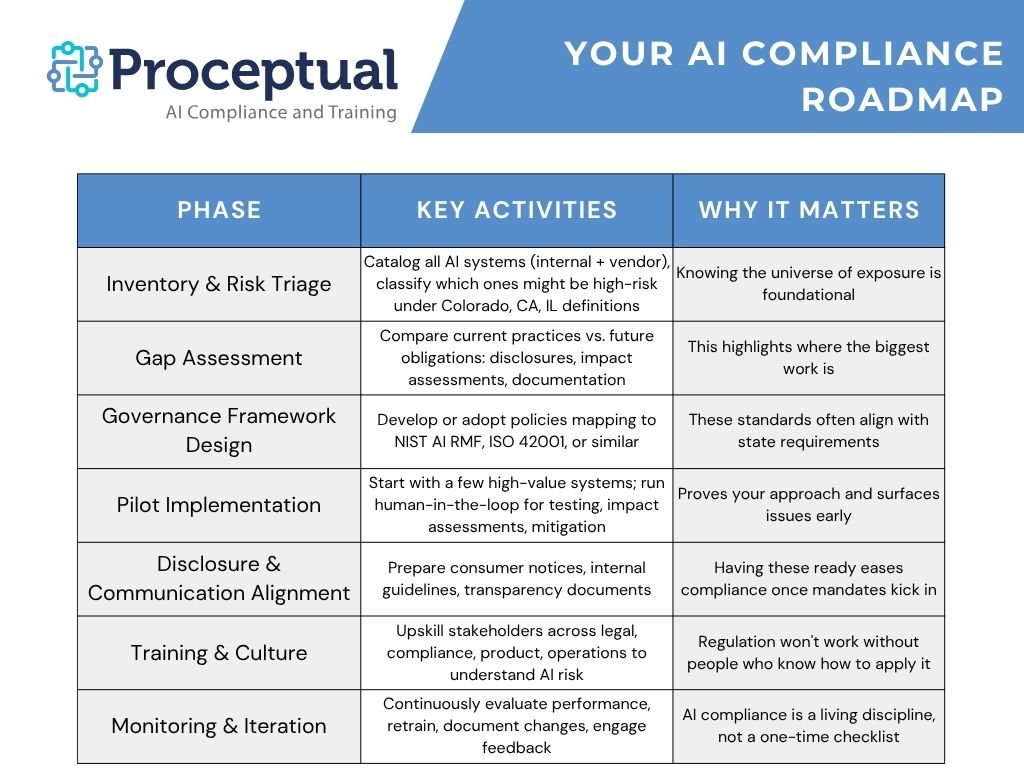The AI regulatory landscape is shifting fast, often in unpredictable ways. In August 2025, Colorado lawmakers enacted a postponement for the implementation of their sweeping AI law, moving the operative date from February 1, 2026, to June 30, 2026. At first glance, such delays may feel like relief to organizations scrambling to comply. But they also underscore a deeper reality: AI governance and compliance is not optional, it’s a moving target. The complexity isn’t going away; it’s only intensifying.
In this blog post, we’ll unpack:
- What the Colorado postponement actually means
- Parallel regulation trends in California and Illinois
- Risks and opportunities for enterprises as state-level AI rules proliferate
- A roadmap to prepare even amid uncertainty
- How Proceptual helps organizations build resilient, compliant AI systems
By the end, you’ll see why delays are not a reason to pause; they’re a cue to step up.
Colorado’s AI Act Postponement: What Actually Changed
The Delay
- Under SB 25B-004, Colorado shifted the effective date of key obligations from February 1, 2026, to June 30, 2026.
- Notably, the law’s substantive obligations remain intact: developers and deployers will still be required to conduct impact assessments, maintain risk management policies, issue disclosures, and guard against algorithmic discrimination.
What Remains
- High-risk AI systems (e.g. in employment, housing, health care, finance) still fall under the law’s domain.
- The obligations around documentation, transparency, disclosures, and mitigation persist. The law continues to recognize NIST AI RMF and ISO 42001 (or analogous standards) as potential safe harbors or rebuttable presumption frameworks.
What the Delay May Signal
- The legislature may revisit the law’s scope or definitions in the 2026 session. It gives organizations breathing room to refine governance programs (rather than rush compliance)
- The delay also highlights that regulatory certainty is low this is likely not the last postponement or legislative tweak
Regulatory Momentum Elsewhere: California & Illinois
Colorado is not an outlier. Across the U.S., states are moving to regulate AI especially where automated decision-making intersects with employment, discrimination, or transparency.
California Tightening the Employment Lens
- Starting October 1, 2025, California will extend anti-discrimination laws (FEHA) to decisions “made or facilitated by AI.” Employers must be accountable even if AI is supplied by third parties.
- Employers must preserve records (including AI/ADS usage) for four years and disclose key information about how AI is used in employment decisions.
- The California Privacy Protection Agency (CPPA) is finalizing rules that require opt-out rights, disclosure, and risk assessment obligations when AI significantly replaces human decision-making.
Illinois Disclosure & Anti-Discrimination
- Illinois HB 3773 takes effect Jan 1, 2026. It requires employers to notify employees/applicants when AI is used in employment decisions (hiring, promotion, etc.).
- The law bans the use of ZIP codes as proxies for protected classes and underscores that any AI outcome that results in discrimination is unlawful.
Takeaway: Patchwork + Overlap
No single federal AI law yet exists to unify the approach. That leaves companies facing a patchwork of state-level regulations. Each state may set its own definitions of “high-risk AI,” disclosure thresholds, liability schemes, and enforcement mechanisms.
State attorneys general are also stepping in using existing laws (consumer protection, civil rights) to prosecute AI misuse.
Risks & Opportunities for Enterprises
Risks of Delay
- False sense of security: Some firms may assume the postponement means no regulation which is a dangerous bet.
- Legacy compliance debt: If you delay work now, you may get stuck with unfinished governance programs after the law becomes active
- Liability mismatch: Enforcement may still begin under other legal theories (discrimination, unfair trade, consumer laws) before Colorado’s law clamps down
- Complexity costs: If you wait, compliance becomes more rushed, fragmented, and costly
Opportunities to Lead
- Strategic advantage: Companies that build compliance frameworks before regulation hits enjoy reputational, operational, and competitive benefits
- Safe harbor alignment: Early adoption of standards like NIST AI RMF / ISO 42001 can give you a defense stance in future audits
- Governance as value creation: AI programs built with risk controls tend to produce better results, drive trust, lower failure rates
- Cross-jurisdiction alignment: Rather than tailor to each state individually, you can use this time to build a unified AI governance framework that scales

Timing is key: the Colorado delay gives you ~5 months of runway before core obligations arrive. Use that to pilot, refine, and scale rather than doing everything at once.
Why Proceptual Is the Right Partner
At Proceptual, our mission is to help organizations implement AI safely, responsibly, and compliantly.
Here’s how we help:
- Regulation-aligned governance design: We map your AI systems to obligations under Colorado, California, Illinois, and other jurisdictions.
- Risk modeling & liability assessment: We help quantify “governance debt” to show up in diligence or board materials.
- Implementation & remediation: We execute impact assessments, bias audits, transparency disclosures, and mitigation plans.
- Upskilling programs: We train cross-functional teams product, engineering, legal, operations to embed compliance thinking in every process.
- Governance-as-a-service: We provide ongoing compliance monitoring, iteration, and documentation services so your AI programs evolve safely.
In short, we don’t just consult and disappear. We help you operationalize AI governance in real systems so regulation becomes an enabler, not a blocker.
Next Steps
The Colorado AI Act postponement is not a carve-out, it’s a moment for strategic advantage. The real battle isn’t against regulation, it’s about discipline, foresight, and trust.
Regulations in California, Illinois, and beyond show that the AI governance moment is now. What you build today your frameworks, culture, disclosures, and data strategy will define whether your AI programs deliver at scale or fail under scrutiny.
If you want help preparing smart, not rushed, for the next wave of AI regulation, let’s talk.
Additional resources: Seyfarth, Bakerbotts, Clark Hill. Nixon Peabody, Reuters
